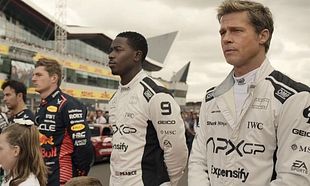Christopher Nolan effectively and accurately captures the relentless panic of this true historical event
Allied soldiers are trapped on the beaches of Dunkirk and completely surrounded. Little by little, the enemy pushes closer as the evacuation gets underway...
Looking at the likes of 'Interstellar', 'Inception' or 'The Dark Knight', it's clear that Christopher Nolan has a good handle on how to make films with a sense of scale and spectacle. It hasn't been since 'The Prestige' that Nolan has attempted to make a small, human drama or thriller - and, in some regards, his films have become more clinical and less emotionally attached. With the likes of 'Interstellar', it pushed too hard to connect with audiences to the point that it verged hard into sentimentality. With 'Dunkirk', Nolan finds another way into the audience - by absolutely terrifying them.
'Dunkirk' opens with a trio of Allied soldiers walking through a deathly quiet street as leaflets, distributed by the nameless enemy from above, flutter down and inform of their fate - they're surrounded and they're going to die. From there, we're introduced to three theatres and a set of characters in each to guide the film along. The sea evacuation has Kenneth Branagh and James D'Arcy as commanders stranded on the beach, whilst Mark Rylance, Barry Keoghan and Tom Glynn-Carey are on board a civilian boat on its way. In the air, Tom Hardy and Jack Lowden are two RAF pilots who've been tasked with providing cover, and between the sea and the beach is Fionn Whitehead, Harry Styles and Aneurin Barnard trying to find their way home.
What it cleverly does is make it less about dialogue and character development and more about the action. There's no long-winded exposition or pause to tell a story about their life before the war; instead, we see them as they are at that moment - panicked, scrambling to get out and utterly terrified. This tells us far more about the characters than any trite anecdote because, as Christopher Nolan has touched upon before, people show you who they are in those last moments. They become more human and relatable as a result of the action and terror surrounding them, and thus give the audience a way to connect with the characters - something that Nolan hasn't always been able to do well.
The cast is chosen well, reigning in their performances to create something far more believable. When you see the likes of Mark Rylance or Kenneth Branagh, there's a sense that the two are going to shout at the rafters - but instead, both give honest and meaningful performances. Likewise, the younger cast members - Keoghan, Styles, Whitehead and Glynn-Carey - all resist the urge to try and push themselves out to capture the camera's attention, instead folding into what's around them. They're human and flawed, and if some of their actions make them seem like cowards, then we're all cowards really.
Nolan makes strong use of the IMAX camera and Hoyte Van Hotema's cinematography to give the film a real sense of scale and presence but doesn't allow itself to become bogged down in period details. Sure, there's Spitfires flying overhead, the few lines of dialogue sound convincing, the uniforms look correct, but it's all about the tension - and this is something that's done beautifully. There are no moments of resounding victory, no swell of orchestras as the Messerschmitts go down - it's all just about keeping the enemy back until everyone gets out. Even at that, Nazi Germany is never mentioned once - it's simply 'the enemy', and they're never seen in human form as such. All we're shown is grown, trained men in a state of chaos who are outgunned, outmatched and desperately trying to survive. Hans Zimmer's score, together with the incredible sound design, adds another layer of oppressive fear on top a film that's already laced with dread, almost to the point that it's unbearable.
The story itself - Operation Dynamo, the Miracle of Dunkirk - could have been shot, directed and acted in a completely different way, with a totally different outcome. It could have been given over to some kind of veneer with pages of script extolling the heroism shown, but what Christopher Nolan has done is effectively and accurately capture the relentless panic - and that makes the film all the more convincing.




















































































